Babarvani of Guru Nanak inspires to stand up for justice and tolerance
Guru Nanak did not hesitate to stand up to Babar and plead the case of innocent victims of Saidpur. Let us all take inspiration from it to stand up, rise against atrocities or discrimination based on politics, caste, race or religion, says author Bhupinder Singh in this significant write-up discovering the times of Babar through Guru Nanak’s Babarvani in Guru Granth Sahib. In the name of winning elections, people are being divided. If the voice of Guru Nanak can bring Babar to his kneels, surely the collective voice of peoples can be effective. WSN hopes that this historical perspective inspires us to align our thoughts and action to deliver meaningful results for justice and inclusiveness in India and the rest of the world, for the Sikhs as well as the world community.
![Guru Nanak did not hesitate to stand up to Babar and plead the case of innocent victims of Saidpur. Let us all take inspiration from it to stand up, rise against atrocities or discrimination based on politics, caste, race or religion, says author Bhupinder Singh in this significant write-up discovering the times of Babar through Guru Nanak’s Babarvani in Guru Granth Sahib. In the name of winning elections, people are being divided. If the voice of Guru Nanak can bring […]](https://www.theworldsikhnews.com/wp-content/uploads/2020/05/Panipaty-battle-360x266.jpg)
ZAHIR-UD-DIN MUHAMMAD, OTHERWISE KNOWN AS BABAR OR ‘TIGER’ was born in 1483 in Andijan, Fergana valley, contemporary Uzbekistan. Babar was of Mongolian descent in the line of the great Genghis Khan (from his mother’s side) and fifth-generation descendent of Timur (from his father’s side), the ruler in Kabul, Afghanistan.
At 11 he became ruler of Fergana. In 1497 he besieged Samarkand for 7 long months, eventually gaining control over it. He lost Samarkand 3 times, so he decided to look beyond and crossed the Hindukush Mountains to capture Kabul in 1504. Next, he trained his eyes on Delhi and Agra enthusiastically with an objective of conquering it, for the wealth which were under the rule of Sikandar Lodi.
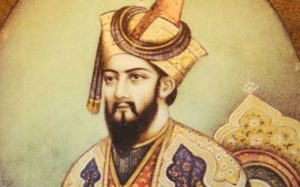 He started his series of invasions into Punjab in the year of the earthquake in 1505 and continued to do so for the next twenty years, further weakening the Lodis. Five incursions and twenty years later, he finally took Delhi and Agra by defeating Ibrahim Lodi in the battle of Panipat in 1526.
He started his series of invasions into Punjab in the year of the earthquake in 1505 and continued to do so for the next twenty years, further weakening the Lodis. Five incursions and twenty years later, he finally took Delhi and Agra by defeating Ibrahim Lodi in the battle of Panipat in 1526.
Although most of the history of that period is written drawing on Babar’s own autobiographical account Babarnama, there is not much mention of this period, thus creating a void. Even if he had recorded it in his autobiography, it would still purely be from his perspective, therefore one-sided. The impact on the citizens from his intrusions lasting 20 years that culminated in his eventual annexation has not been documented from the victim’s perspective or recorded in history. However, we have some very insightful first-hand accounts to fill the gap. The observations of Guru Nanak Dev Ji preserved in Sri Guru Granth Sahib provide that vital missing insight.
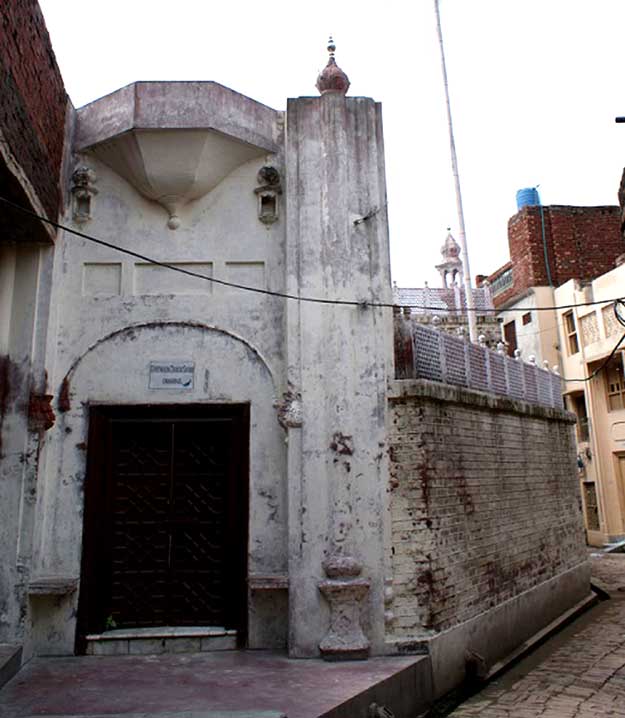 After his first intrusion in 1505, it took him another fifteen years to try again in 1520. Next, during his third intrusion in 1521, Sialkot surrendered without a fight. But Eminabad, also known as Saidpur presented a stark opposite by putting up a fight. Now let us explore what transpired from Guru Ji’s eyewitness account:
After his first intrusion in 1505, it took him another fifteen years to try again in 1520. Next, during his third intrusion in 1521, Sialkot surrendered without a fight. But Eminabad, also known as Saidpur presented a stark opposite by putting up a fight. Now let us explore what transpired from Guru Ji’s eyewitness account:
ਖੁਰਾਸਾਨ ਖਸਮਾਨਾ ਕੀਆ ਹਿੰਦੁਸਤਾਨੁ ਡਰਾਇਆ ॥
Translation and Meaning: Having attacked Khuraasaan, Baabar terrified Hindustan. Babar took away an area now known as “Razavi Khorasan (most parts in modern Iran)” and threatened to unleash his force on India.
-Guru Granth Sahib Page 360
The Pathan rulers of Saidpur summoned the Mullahs and Pirs, who offered their help with spells and incantations that will blind the marauding forces. The reality unfolded quite differently as described by translation of Guru Ji’s words:
ਕੋਟੀ ਹੂ ਪੀਰ ਵਰਜਿ ਰਹਾਏ ਜਾ ਮੀਰੁ ਸੁਣਿਆ ਧਾਇਆ॥
ਥਾਨ ਮੁਕਾਮ ਜਲੇ ਬਿਜ ਮੰਦਰ ਮੁਛਿ ਮੁਛਿ ਕੁਇਰ ਰੁਲਾਇਆ ॥
ਕੋਈ ਮੁਗਲੁ ਨ ਹੋਆ ਅੰਧਾ ਕਿਨੈ ਨ ਪਰਚਾ ਲਾਇਆ ॥੪॥
ਮੁਗਲ ਪਠਾਣਾ ਭਈ ਲੜਾਈ ਰਣ ਮਹਿ ਤੇਗ ਵਗਾਈ॥
ਓਨ੍ਹੀ ਤੁਪਕ ਤਾਣਿ ਚਲਾਈ ਓਨ੍ਹੀ ਹਸਤਿ ਚਿੜਾਈ ॥
ਜਿਨ੍ਹ ਕੀ ਚੀਰੀ ਦਰਗਹ ਪਾਟੀ ਤਿਨ੍ਹਾ ਮਰਣਾ ਭਾਈ ॥੫॥
ਇਕ ਹਿੰਦਵਾਣੀ ਅਵਰ ਤੁਰਕਾਣੀ ਭਟਿਆਣੀ ਠਕੁਰਾਣੀ ॥
ਇਕਨ੍ਹਾ ਪੇਰਣ ਸਿਰ ਖੁਰ ਪਾਟੇ ਇਕਨ੍ਹਾ ਵਾਸੁ ਮਸਾਣੀ ॥
ਜਿਨ੍ਹ ਕੇ ਬੰਕੇ ਘਰੀ ਨ ਆਇਆ ਤਿਨ੍ਹ ਕਿਉ ਰੈਣਿ ਵਿਹਾਣੀ ॥੬॥
ਆਪੇ ਕਰੇ ਕਰਾਏ ਕਰਤਾ ਕਿਸ ਨੋ ਆਖਿ ਸੁਣਾਈਐ ॥
ਦੁਖੁ ਸੁਖੁ ਤੇਰੈ ਭਾਣੈ ਹੋਵੈ ਕਿਸ ਥੈ ਜਾਇ ਰੂਆਈਐ ॥
ਹੁਕਮੀ ਹੁਕਮਿ ਚਲਾਏ ਵਿਗਸੈ ਨਾਨਕ ਲਿਖਿਆ ਪਾਈਐ ॥੭॥੧੨॥
“Millions of religious leaders failed to halt the invaders when they heard of the Mir’s (Babar’s) invasion. Still, he burned the houses, mansions and the ancient rock-solid structures; he cut the princes limb from limb and cast them into the dust. None of the Mughals went blind, and no one (pir/mullahs) performed (any promised) miracle. The battle raged between the Mughals and the Pathans, and the swords clashed on the battlefield. They (invaders) took aim and fired their guns, and defenders attacked back with their elephants. Those, whose hour of death had come, were destined to die, O Siblings of Destiny. Their wives – Hindu women, the Muslim women, the Bhattis and the Rajputs had their robes torn away, from head to foot. Their own dwelling places have been transformed into cremation ground. Their (Women survivors) husbands did not return home – how did they pass their night? ”
Guru Granth Sahib 417
The arrows, spears and unwieldy elephants of Pathan rulers could hardly match the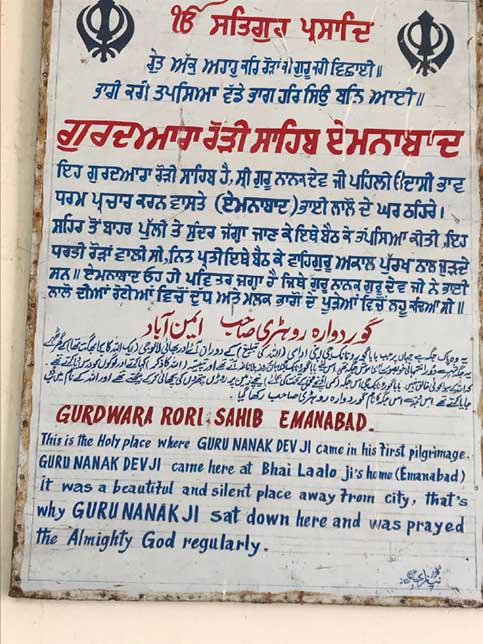 precision, effectiveness or the deadly ferocity of guns and cannons of the invaders. In addition, their easy lifestyle of pleasures, coupled with tyranny on the populace had already weakened their fighting prowess. Thus even with a much larger army, they could not put strong viable defence. Guru Ji has painted the picture of those Hindu women’s well-endowed earlier life, in these words:
precision, effectiveness or the deadly ferocity of guns and cannons of the invaders. In addition, their easy lifestyle of pleasures, coupled with tyranny on the populace had already weakened their fighting prowess. Thus even with a much larger army, they could not put strong viable defence. Guru Ji has painted the picture of those Hindu women’s well-endowed earlier life, in these words:
ਰਾਗੁ ਆਸਾ ਮਹਲਾ ੧ ਅਸਟਪਦੀਆ ਘਰੁ ੩ ੴ ਸਤਿਗੁਰ ਪ੍ਰਸਾਦਿ ॥
Raag Aasaa, First Mehla, Ashtpadheeyaa, Third House:
One Universal Creator God. By The Grace Of The True Guru:
ਜਿਨ ਸਿਰਿ ਸੋਹਨਿ ਪਟੀਆ ਮਾਂਗੀ ਪਾਇ ਸੰਧੂਰੁ ॥
ਸੇ ਸਿਰ ਕਾਤੀ ਮੁੰਨੀਅਨ੍ਹਿ ਗਲ ਵਿਚਿ ਆਵੈ ਧੂੜਿ ॥
ਮਹਲਾ ਅੰਦਰਿ ਹੋਦੀਆ ਹੁਣਿ ਬਹਣਿ ਨ ਮਿਲਨ੍ਹਿ ਹਦੂਰਿ ॥੧॥
ਆਦੇਸੁ ਬਾਬਾ ਆਦੇਸੁ ॥
ਆਦਿ ਪੁਰਖ ਤੇਰਾ ਅੰਤੁ ਨ ਪਾਇਆ ਕਰਿ ਕਰਿ ਦੇਖਹਿ ਵੇਸ ॥੧॥ ਰਹਾਉ ॥
“Those heads adorned with braided beautiful tresses, with their hair partings lined with vermillion, now those locks were shorn with scissors, and their heads, throats were choked with dust (as they were dragged along the dusty routes of Hindukush, being taken for sale). They had lived in palatial mansions (with private chambers), but now, they cannot even sit near in public. ”
Guru Granth Sahib Page 417

Guru Ji even described their lavish wedding scenario in these words:
ਜਦਹੁ ਸੀਆ ਵੀਆਹੀਆ ਲਾੜੇ ਸੋਹਨਿ ਪਾਸਿ ॥
ਹੀਡੋਲੀ ਚੜਿ ਆਈਆ ਦੰਦ ਖੰਡ ਕੀਤੇ ਰਾਸਿ ॥
ਉਪਰਹੁ ਪਾਣੀ ਵਾਰੀਐ ਝਲੇ ਝਿਮਕਨਿ ਪਾਸਿ ॥੨॥
ਇਕੁ ਲਖੁ ਲਹਨ੍ਹਿ ਬਹਿਠੀਆ ਲਖੁ ਲਹਨ੍ਹਿ ਖੜੀਆ ॥
ਗਰੀ ਛੁਹਾਰੇ ਖਾਂਦੀਆ ਮਾਣਨ੍ਹਿ ਸੇਜੜੀਆ ॥
ਤਿਨ੍ਹ ਗਲਿ ਸਿਲਕਾ ਪਾਈਆ ਤੁਟਨ੍ਹਿ ਮੋਤਸਰੀਆ ॥੩॥
ਧਨੁ ਜੋਬਨੁ ਦੁਇ ਵੈਰੀ ਹੋਏ ਜਿਨ੍ਹੀ ਰਖੇ ਰੰਗੁ ਲਾਇ ॥
ਦੂਤਾ ਨੋ ਫੁਰਮਾਇਆ ਲੈ ਚਲੇ ਪਤਿ ਗਵਾਇ ॥
ਜੇ ਤਿਸੁ ਭਾਵੈ ਦੇ ਵਡਿਆਈ ਜੇ ਭਾਵੈ ਦੇਇ ਸਜਾਇ ॥੪॥
“They came in palanquins, decorated (hands) with ivory bangles; water was sprinkled over their heads, and glittering fans were waved above them. 2. They were given hundreds of thousands of rupees as wedding gifts when they sat, and hundreds of thousands Rupees when they stood up. They ate coconuts and dates and rested comfortably upon their cosy beds. But now ropes were put around their necks, and their strings of pearls were broken (replaced with a noose). 3. Their wealth and youthful beauty, which afforded them a good life, have now become their enemies. The order was given to the soldiers, who dishonoured them, and carried them away as captives. If it is pleasing to God’s Will, He bestows greatness; if it pleases His Will, He bestows punishment. 4.”
Guru Granth Sahib Page 417
The fate of the spouses of these women was described in these words:
ਬਾਬਰਵਾਣੀ ਫਿਰਿ ਗਈ ਕੁਇਰੁ ਨ ਰੋਟੀ ਖਾਇ ॥੫॥
“Since Babar’s rule has been proclaimed, even the princes have no food to eat. 5.” Guru Granth Sahib Page 417
In one line Guru Ji shares the ferocity of rapine rule that was unleashed and asks Almighty if He felt the pain and if compassion flowed out of Him in these words:
ਏਤੀ ਮਾਰ ਪਈ ਕਰਲਾਣੇ ਤੈਂ ਕੀ ਦਰਦੁ ਨ ਆਇਆ ॥੧॥
“There was so much slaughter that the people screamed. Didn’t You feel compassion, Lord? ”
Guru Granth Sahib Page 360
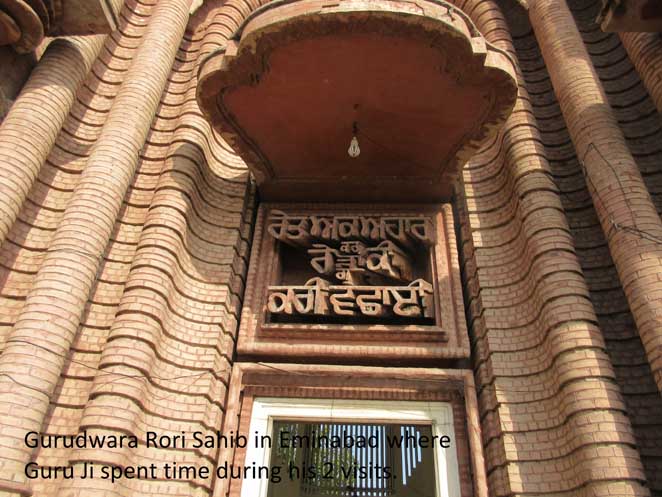 Guru Ji chose to come to Saidpur, in harm’s way. Guru Ji was returning back from his long journey of the west, where he had visited Mecca and Baghdad among other places. Only to be with the populace, shows his concern for them and a desire to help. He did not have an army to oppose the invaders, but where his sympathies lay is clear from his writings. They are the outpourings of a compassionate soul touched by scenes of human misery at the cruelty perpetrated by the invaders. The outpouring of compassion in Guru Ji’s heart at the suffering of his compatriots was flowing out, together with a scathing attack on Lodis in these words:
Guru Ji chose to come to Saidpur, in harm’s way. Guru Ji was returning back from his long journey of the west, where he had visited Mecca and Baghdad among other places. Only to be with the populace, shows his concern for them and a desire to help. He did not have an army to oppose the invaders, but where his sympathies lay is clear from his writings. They are the outpourings of a compassionate soul touched by scenes of human misery at the cruelty perpetrated by the invaders. The outpouring of compassion in Guru Ji’s heart at the suffering of his compatriots was flowing out, together with a scathing attack on Lodis in these words:
ਸਕਤਾ ਸੀਹੁ ਮਾਰੇ ਪੈ ਵਗੈ ਖਸਮੈ ਸਾ ਪੁਰਸਾਈ ॥
ਰਤਨ ਵਿਗਾੜਿ ਵਿਗੋਏ ਕੁਤੀ ਮੁਇਆ ਸਾਰ ਨ ਕਾਈ ॥
“But if a powerful tiger attacks a flock of sheep and kills them, then its master must answer for it. This priceless country has been laid waste and defiled by dogs (of Lodis), and no one remembers them with regards when they are dead.”
Guru Granth Sahib Page 360
The population, both Hindus and Pathans suffered at the hands of invaders. Guru Ji felt as if the elite ruling class were intoxicated in their opulent lifestyle and had never remembered God. He paints the picture of plight by taking an example of Hindus willing to convert to save themselves in these words:
ਰਾਮੁ ਨ ਕਬਹੂ ਚੇਤਿਓ ਹੁਣਿ ਕਹਣਿ ਨ ਮਿਲੈ ਖੁਦਾਇ ॥੬॥
“They never remembered their Lord as Raam, and now they cannot even chant Khudaa-i.”
Guru Granth Sahib Page 417
This is a portrayal of a pretty grim scenario, as Guru Ji is sharing with us the fact that even if they were willing to embrace the faith of the invaders, it still did not offer any respite from the atrocities. Not only did he plead to Almighty, but by becoming a prisoner of Babar, he pleaded with Babar to release all the prisoners. The net result was all the prisoners taken from Saidpur (Aminabad) were released and their properties returned to them at Guru Ji’s bidding. Babar was called back from this place to Kabul to meet a threatened attack upon that capital.
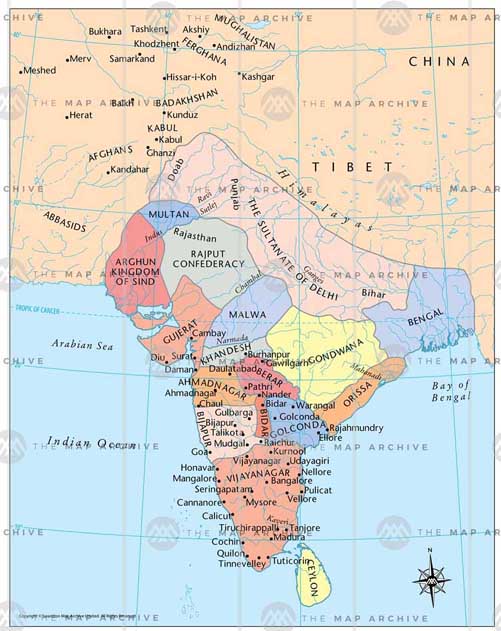 Finally, in 1526 Babar succeeded in toppling the weak regime in Delhi. With a small but very mobile force he had crossed the River Indus, and helped by new gunpowder technology, was able to overpower the much larger Lodi army. The final nail in the coffin of Lodi kingdom was the battle of Panipat. It is estimated that Babar’s forces numbered around 15,000 men and had between 20 to 24 pieces of field artillery. Babar estimated Lodi had around 100,000 men, though that number included camp followers, while the fighting force was around 30,000 to 40,000 men in total, along with at least 1000 war elephants. The battle only lasted till midday; it speaks about its quick end without a stiff fight from the Lodis. The battle finds mention in the history books, but the details of earlier intrusions preceding this event are obscured.
Finally, in 1526 Babar succeeded in toppling the weak regime in Delhi. With a small but very mobile force he had crossed the River Indus, and helped by new gunpowder technology, was able to overpower the much larger Lodi army. The final nail in the coffin of Lodi kingdom was the battle of Panipat. It is estimated that Babar’s forces numbered around 15,000 men and had between 20 to 24 pieces of field artillery. Babar estimated Lodi had around 100,000 men, though that number included camp followers, while the fighting force was around 30,000 to 40,000 men in total, along with at least 1000 war elephants. The battle only lasted till midday; it speaks about its quick end without a stiff fight from the Lodis. The battle finds mention in the history books, but the details of earlier intrusions preceding this event are obscured.
Guru Nanak had foretold about this eventuality. If the rulers had woken up right after the first onslaught and used the time to prepare for the final onslaught on how to counter the guns and cannons, history could have been different. In the words of Stanley Lane-Poole the biographer of Babar, “The battle of Panipat became a tomb for the Afghans of Delhi. Their state was destroyed and their strength was absolutely crippled.”
Guru Ji’s forecast to Saidpur resident named Lalo is in these words:
ਕਾਇਆ ਕਪੜੁ ਟੁਕੁ ਟੁਕੁ ਹੋਸੀ ਹਿਦੁਸਤਾਨੁ ਸਮਾਲਸੀ ਬੋਲਾ ॥
“The body-fabric will be torn apart into shreds, and then India will forever remember this event.”
Guru Granth Sahib Page 722
Further, Guru likened the invaders to a bridal party looking to take India as a bride. In the same Shabad, Guru Ji also said these words:
ਖੂਨ ਕੇ ਸੋਹਿਲੇ ਗਾਵੀਅਹਿ ਨਾਨਕ ਰਤੁ ਕਾ ਕੁੰਗੂ ਪਾਇ ਵੇ ਲਾਲੋ ॥੧॥
“The wedding songs of murder are sung, O Nanak, and blood is sprinkled instead of saffron, O Lalo. 1.”
Guru Granth Sahib Page 722
Where can we find these facts in the history books? Why are these not part of the books? We have failed to share these facts with our children by not including them in the history books. This is a serious failing and a lapse on our part. Even have not been able to rewrite history from our own perspective. It is time historians took corrective initiatives and addressed these vital missing details.
If we have to learn from our history, first we should record it, then share it and then implement it like Guru Nanak.
Reference and Links:
Map of India at the time of Babur’s invasion:
https://www.themaparchive.com/india-on-the-eve-of-baburs-invasion-1525.html
References:
- www.Sikhitothemax.com
- www.Sikhiwiki.org/index.php/Babar_Vani
- www.Allaboutsikhs.com/scriptures/babar-vani
- Singh, Kartar, Guru Nanak Dev: Life and Teachings. Lahore Book Shop, Ludhiana
- Hebber, Dr. Neria H, A Tireless Tiger from Kabul – Babur (1484–1530). www.Boloji.com
 An engineer by profession, hailing from Myanmar, educated in India, Bhupinder Singh is a Houston-based businessman, with a keen interest in writing books and articles on Sikh history, motivation and spirituality. The books he has written include, Connecting with the Master – A collection of essays on topics related to Sikhism, Gurmat Quotient (GQ) – Book on development of Spirituality, Rehraas – With meaning and commentary in English, Why are We Here? – Become exploring the purpose of human life, Fish Eat Fish World – An Illustrated Children’s book, Humility – A Spiritual Journey, In Bully’s Eyes – An Illustrated Children’s book on Bullying.
An engineer by profession, hailing from Myanmar, educated in India, Bhupinder Singh is a Houston-based businessman, with a keen interest in writing books and articles on Sikh history, motivation and spirituality. The books he has written include, Connecting with the Master – A collection of essays on topics related to Sikhism, Gurmat Quotient (GQ) – Book on development of Spirituality, Rehraas – With meaning and commentary in English, Why are We Here? – Become exploring the purpose of human life, Fish Eat Fish World – An Illustrated Children’s book, Humility – A Spiritual Journey, In Bully’s Eyes – An Illustrated Children’s book on Bullying.

One thought on “Babarvani of Guru Nanak inspires to stand up for justice and tolerance”